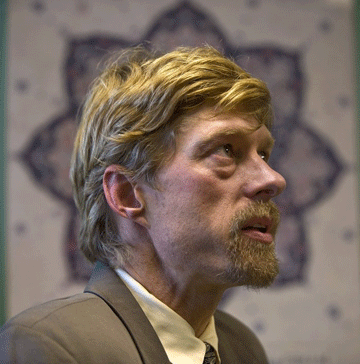
Flagg Miller, an assistant professor of at UC Davis, translated and analyzed about 20 tapes of Osama bin Laden. Photography by HECTOR AMEZCUA
UC Davis researcher delves into the mind of bin Laden
By Bobby Caina Calvan, The Sacramento Bee, Thursday, September 11, 2008
For five years, a University of California, Davis, researcher has been replaying hundreds of hours of audiocassettes that, he says, yield deeper – and more complex – insights into the intellectual development of Osama bin Laden.
A collection of 1,500 audiocassettes was carted away from bin Laden’s compound in Kandahar, Afghanistan, in 2001 and provides a glimpse into bin Laden’s rise leading up to the Sept. 11, 2001, terrorist attacks.
Certainly, few would dare humanize the man the United States calls its most wanted, who seven years after the country’s deadliest terrorist attacks is still being sought dead or alive.
On the seventh anniversary of the attacks, the most brazen ever carried out anywhere in the world, bin Laden still looms large on the American psyche, its politics and public life.
Nearly 3,000 people died in attacks when four hijacked U.S. jetliners crashed into New York’s World Trade Center, the Pentagon and into a rural field in Pennsylvania.
In the years since the 2001 terrorist attacks, the Osama bin Laden who Americans have come to know and demonize has arrived in video dispatches – monologues excoriating the United States and filled with promises of further violence on American soil.
The audio tapes, some dating back to the 1960s, “show his evolution from a relatively unpolished Muslim reformer, orator and jihad recruiter to his current person,” said Flagg Miller, an assistant professor of religious studies at UC Davis and the first academic researcher to study the tapes.
“It makes it difficult to separate yourself and realize that this is what led to such horrific things as the 9/11 attack,” Miller said.
“You get a sense from these tapes of a man who’s seeking. He’s a seeker. He hasn’t figured it all out. We only have the faintest outlines of the logic,” Miller said.
Miller said that bin Laden took many years to hone his message and political platform. At times, he has referred to non-Muslims as “dogs,” but has also urged followers to engage civilly with Western governments by launching letter-writing campaigns to protest Israel’s policies toward Palestinians, most of them Muslim.
But bin Laden has consistently labeled the United States as his top enemy, according to Miller. “I’m not interested in simplifying the mind of bin Laden. I’m interested in unpacking the collective debate about al-Qaida.”
Only 20 of the tapes contain recordings of bin Laden but have been a trove of information to shed light on his emergence as a key militant in the al-Qaida movement, said Miller, who is fluent in Arabic and undertook the vast – and unfinished – task of translating many of the tapes.
In one recording, a specific place and date unknown, bin Laden recalls his days in the Afghan mountains as Soviet bombs made martyrs of the jihadi fighters.
He described in gory detail the carnage in those mountains. “By the honor that God granted him, the martyr does not feel pain,” bin Laden says, according to Miller’s translation.
The audiocassettes were first acquired by CNN as part of a haul of items taken from bin Laden’s Kandahar home after the Taliban fled the city on Dec. 7, 2001. The Cable News Network offered the tapes to the FBI, but the agency declined to take possession, according to UC Davis officials. The tapes were then handed over to the Williams College Afghan Media Project, located in Williamstown, Mass.
The audiocassettes, some in various stages of deterioration, are now at Yale University, where they are being cleaned, cataloged and digitized – a process that could take years to complete.
Some of the tapes were apparently given to bin Laden as gifts.
Miller is scheduled to lecture about the tapes in Berlin next week. A paper based on Miller’s research will appear in next month’s issue of the journal Language & Communication.
In the end, the insights into bin Laden could add a deeper understanding of the complexities of global terrorism, Miller said.
“There’s no doubt he played a part in a number of horrific terroristic attacks,” Miller said. The recordings provide an added dimension to bin Laden’s role in the wider al-Qaida movement.
Among those who died in the 9/11 attacks were the 19 hijackers who commandeered the four American commercial airplanes – ostensibly to become martyrs.
“We’re always trying to teach ourselves better, to get beyond the demonization, and it’s a question of understanding, of using these cassettes and to seek and learn ourselves what we don’t know,” Miller said.
Copyright © The Sacramento Bee